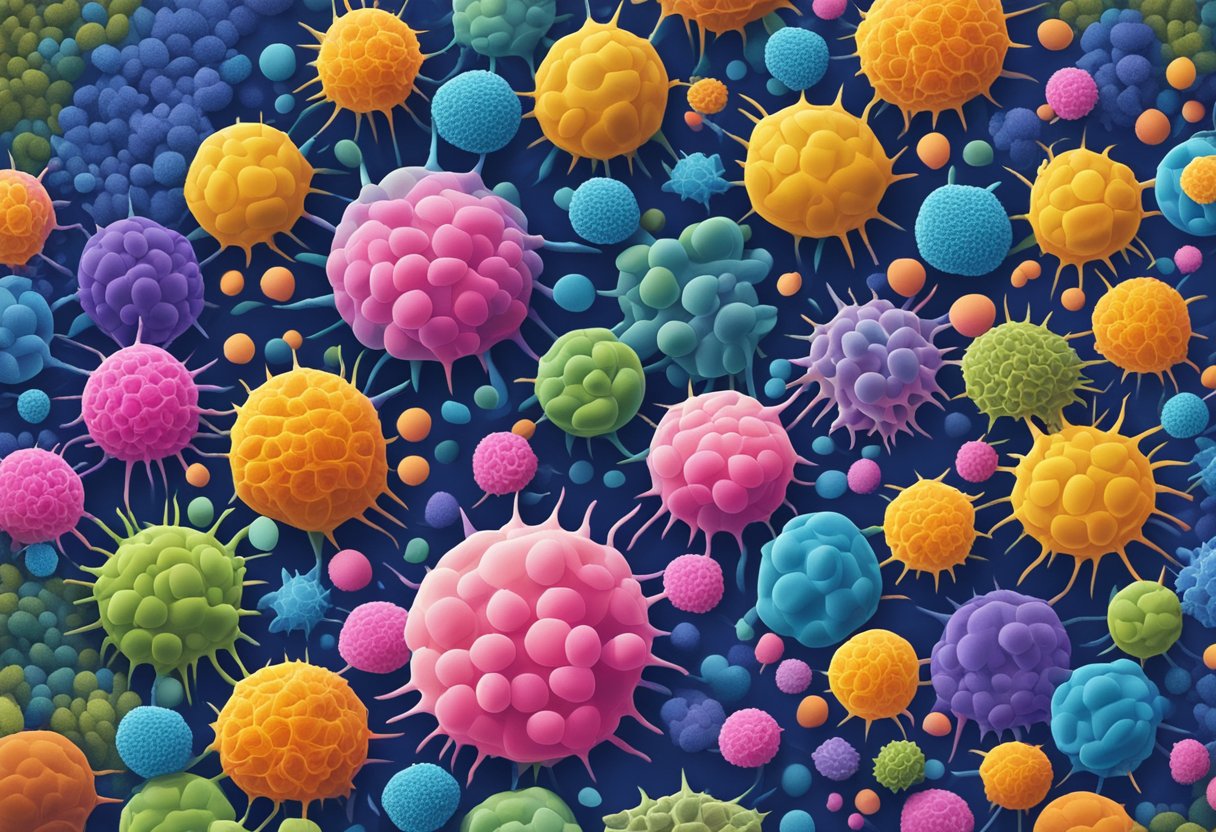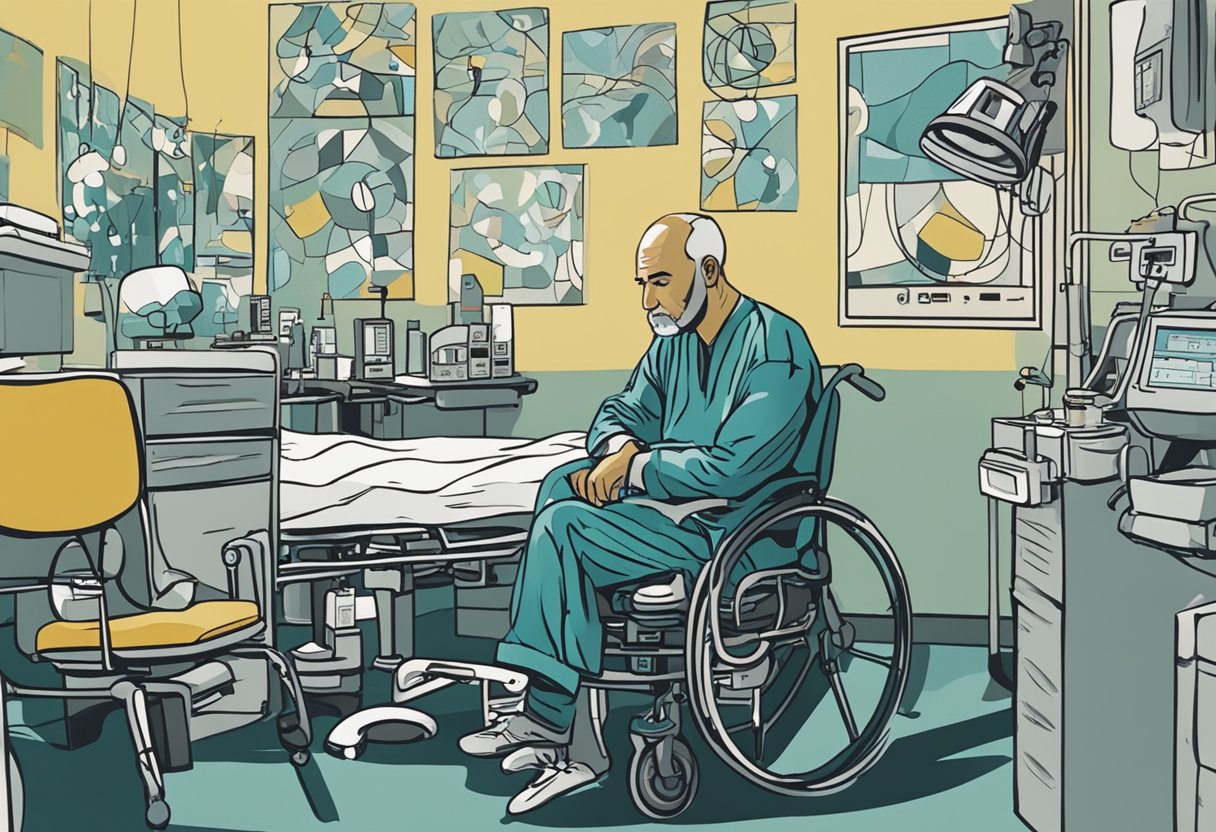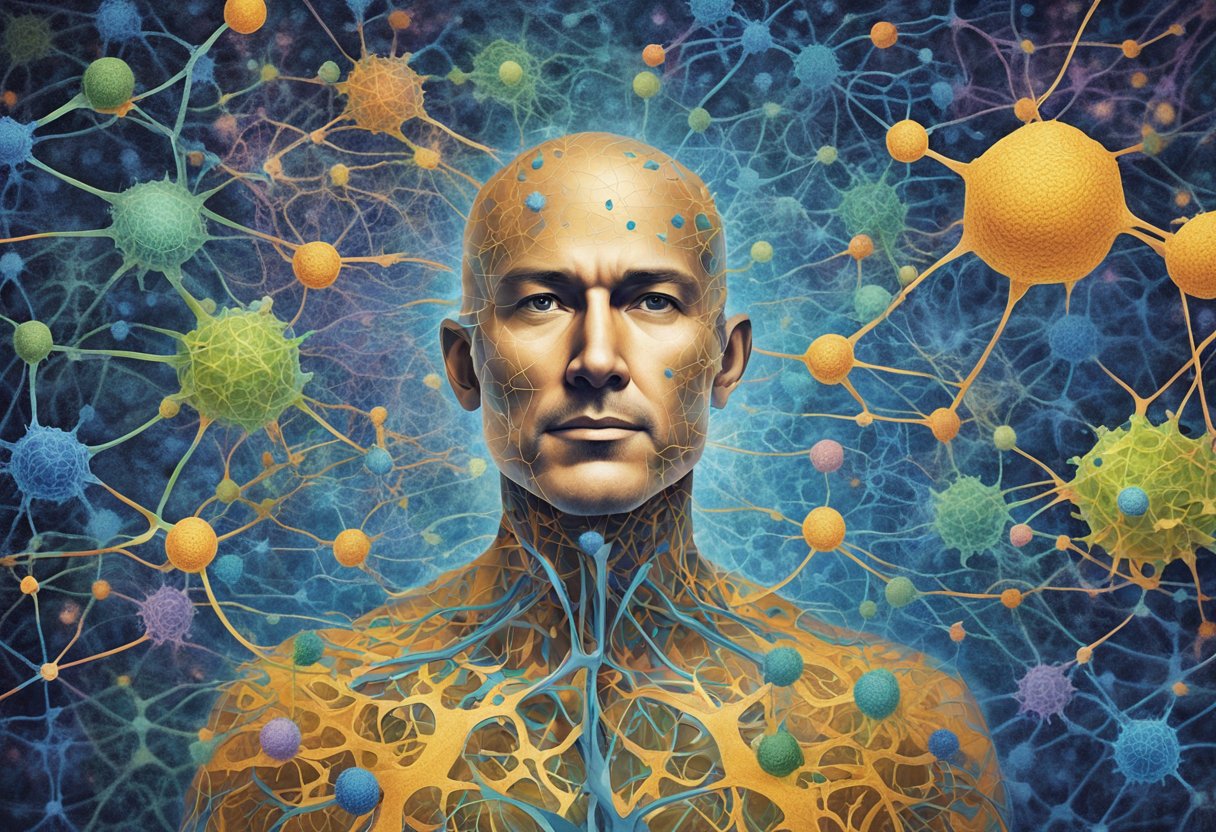Insights for Male Cancer Survivors’ Health and Recovery
Psychoneuroimmunology (PNI) explores how our minds, nervous systems and immune responses are connected, especially in male cancer survivors. As someone who beat lymphoma twice, I know the power of PNI in navigating cancer’s challenges. Understanding how stress impacts our immune system can transform our approach to cancer care.

Male cancer survivors face unique hurdles, both physically and emotionally. Psychosocial stress can influence cancer progression and treatment outcomes.
By exploring PNI, we can discover ways to bolster our immune response and potentially improve our quality of life during and after treatment. Stress management isn’t just about feeling better; it’s about survival and thriving.
Cancer doesn’t just challenge our bodies—it tests our minds.
In our journey, integrating PNI principles offers hopeful strategies to strengthen our fight against male-specific cancers like prostate and testicular cancer.
Knowledge about PNI and its biological mechanisms can empower us to take charge of our health and recovery.
Key Takeaways
- Psychoneuroimmunology links the mind, nervous system, and immune response.
- Stress management can influence cancer progression and outcomes.
- Integrating PNI principles offers hopeful strategies for male cancer survivors.
Fundamentals of Psychoneuroimmunology

Psychoneuroimmunology explores connections between the nervous system, immune system, and psychological factors, providing insights into how these complex systems interact, especially for men who have survived cancer.
Biobehavioral Influences on Immunity
Biobehavioral factors significantly influence our immune responses.
For instance, stress can alter how white blood cells function, making us more prone to infections.
Lifestyle choices like diet, exercise, and sleep also impact immune health.
Regular physical activity boosts immune function by promoting the circulation of immune cells.
A balanced diet rich in vitamins and minerals is essential for maintaining a robust immune system.
Proper sleep helps produce and release cytokines, proteins vital for immune response.
Understanding these factors can guide us toward better health practices, which is crucial for cancer survivors like us.
Psychosocial Factors and Neuroendocrine Pathways
Psychosocial elements, like emotional support and mental health, affect our physical wellbeing.
Social connections can decrease stress and improve overall health.
The neuroendocrine system, which involves hormones and the nervous system, also affects immune function.
For example, cortisol, a stress hormone, can suppress immune responses if it remains elevated for long periods.
Relaxation techniques like meditation and deep breathing can help regulate hormone levels and reduce stress.
These practices are beneficial for cancer survivors facing ongoing health challenges.
Understanding these interactions helps us adopt healthier lifestyles and effectively manage the challenges of being male cancer survivors.
Cancer Development and the Immune Response

Understanding how cancer develops and how the immune system responds provides insights into combating this disease.
We will explore how tumor cells interact with immune cells and the effects of chronic stress on cancer progression.
Tumor Biology and Immune Cells
Tumor cells arise when normal cells undergo mutations that cause them to grow uncontrollably. These cells can evade the immune system, making it hard for the body to fight the disease.
Like T-cells and natural killer cells, immune cells typically recognize and destroy abnormal cells.
However, cancer cells can produce signals that suppress immune responses, allowing tumors to grow.
For example, some cancers release chemicals that inhibit T-cell function. This inhibition weakens our body’s ability to keep tumor growth in check.
Studies have found that tumor-infiltrating lymphocytes can indicate a better prognosis, as these cells are critical for mounting an immune response against cancer.
Chronic Stress and its Effects on Cancer Progression
Chronic stress can negatively affect our immune function, contributing to disease progression in cancer patients.
Stress leads to the release of cortisol, a hormone that suppresses immune responses, making it easier for tumors to grow.
Cortisol impacts cellular immunity by decreasing the activity of T-cells, which are essential for fighting cancer cells.
Additionally, stress-related conditions can slow healing and promote inflammation, further aiding tumor development.
Research indicates stress management techniques like exercise and mindfulness can improve immune function and potentially slow cancer progression.
Maintaining a balanced lifestyle can support our immune system in combating cancer more effectively.
Refer to this article for more insight on tumor biology and immune cells. Chronic stress impacts cancer progression, which can be explored further in this study.
Psychosocial Stress and Cancer Outcomes

Cancer patients often face high levels of psychosocial stress, which can affect their health and survival rates. The following subsections discuss how stress impacts metastasis and recurrence and the role of socioeconomic status in cancer prognosis.
Impact of Stress on Metastasis and Recurrence
Stress can significantly affect cancer outcomes.
For instance, psychosocial stress has been linked to increased tumor growth and metastasis.
When our bodies are under chronic stress, they release stress hormones like cortisol and adrenaline. These hormones can suppress immune function, making it easier for cancer cells to spread.
With a weakened immune system, the body can fight off cancer cells already broken away from the primary tumor.
In men, managing stress is crucial for preventing recurrence.
Studies show that stress management can enhance immune responses.
For male cancer survivors, this is particularly relevant. Relaxation techniques, regular physical activity, and seeking social support reduce stress levels.
The Role of Socioeconomic Status in Cancer Prognosis
Socioeconomic status (SES) is critical in cancer prognosis and survivorship.
Men from lower SES backgrounds often have poorer access to healthcare, which leads to late-stage diagnoses and limited treatment options.
Financial stress can also exacerbate health problems, reducing the ability to manage the disease effectively.
Research indicates that men with lower SES are more likely to experience higher levels of psychosocial stress.
This stress, coupled with limited resources, can lead to worse cancer outcomes.
Community programs that provide support and resources can help alleviate some of these stresses, offering a better prognosis for men regardless of socioeconomic status.
Addressing these disparities is essential for improving cancer survival rates among men.
Psychoneuroimmunology in Male Cancer Survivorship

Understanding the role of psychoneuroimmunology (PNI) in male cancer survivorship can help us navigate post-treatment challenges and develop effective interventions and support systems.
Navigating Post-Treatment Challenges
Many of us face lingering issues after cancer treatment.
For male cancer survivors, these challenges can include fatigue, pain, and emotional distress.
For instance, about one in four cancer survivors deals with fatigue or pain. These symptoms can make returning to daily activities like work or hobbies hard.
Emotional stress is also a problem.
It can affect our sleep and relationships, making it challenging to feel normal again.
Understanding how our mental state impacts our immune system helps us tackle these problems more effectively.
Learning about the physical and emotional challenges can guide us toward better management strategies.
Behavioral Interventions and Support Systems
Behavioral interventions can play a significant role in our recovery.
Exercise programs tailored to our capabilities can improve physical strength and emotional well-being.
Meditation and mindfulness can help reduce stress and improve sleep.
Studies show these practices can benefit our mental and physical health, making them valuable tools in our recovery.
Support systems are crucial.
Whether it’s family, friends, or support groups, having someone to talk to can make a huge difference.
Social support helps us feel connected and understood, vital for our emotional health.
Engaging in group activities can also provide much-needed motivation and companionship.
Effective support systems enhance our ability to cope with the aftermath of cancer treatment, fostering a healthier and more fulfilling life.
Biological Mechanisms and Pathways

In our journey as male cancer survivors, understanding how biological mechanisms and pathways influence our health is crucial.
We will examine how inflammation, immune responses, and neuroendocrine pathways play crucial roles in cancer progression and survivorship.
Inflammatory and Immunological Markers
Inflammation and immune responses are vital players in cancer.
When we discuss signal transduction in cancer, cytokines are chemicals that pass signals between cells and can either help or hinder tumor growth.
Elevated inflammatory markers like C-reactive protein (CRP) often indicate a heightened immune response.
For survivors, managing inflammation involves monitoring these markers.
Specific treatments aim to decrease inflammation and slow cancer progression.
We must understand how cytokines and other markers influence our overall health, providing insights into potential complications like chronic pain or fatigue.
Researchers are exploring how to leverage these markers to develop better treatments.
By tracking changes in our immune system, we can tailor therapies to our unique needs, ultimately improving our quality of life and long-term prognosis.
Neuroendocrine Pathways in Cancer Progression
Neuroendocrine pathways are another critical aspect of cancer biology.
These pathways involve the release of hormones in stress response, which can influence cancer cell growth.
Stress hormones like cortisol can affect how our bodies respond to cancer and therapy.
During recovery, managing stress becomes essential.
High-stress levels can lead to increased production of hormones that may promote tumor growth by enhancing processes like angiogenesis, which supplies tumors with blood, and apoptosis, the programmed death of cells.
Focusing on mindfulness and relaxation techniques can help regulate these pathways.
By reducing stress, we potentially lower the impact on our cancer outcomes.
Understanding these mechanisms allows us to navigate our lives post-treatment better and maintain our health.
PNI and Treatment Strategies
Psychoneuroimmunology (PNI) offers promising approaches integrating psychological and biological treatments for cancer survivors. We explore innovative therapies and future applications in PNI.
Innovative Psycho-Oncology Therapies
In battling cancer, integrating psychological therapies with traditional treatments can enhance outcomes and quality of life.
Cognitive-behavioral therapy (CBT) helps us manage stress and anxiety, which can affect immune function.
Mindfulness-based stress reduction (MBSR) has shown success in reducing depression and boosting immune markers, aiding in the recovery process.
Biofeedback is another tool we use to gain better control over physiological functions such as heart rate and muscle tension.
It helps us reduce the adverse effects of stress on the body, potentially decreasing cancer progression.
Translational Applications and Future Directions
Translational research in PNI focuses on applying clinical findings to real-world settings.
This approach helps develop new chemoprevention strategies and improve existing cancer treatments.
These strategies include assessing how stress reduction and immune modulation can reduce cancer recurrence.
As we look ahead, we see potential in combining PNI methodologies with genetic and molecular studies.
These methodological innovations can lead to more personalized treatments, optimizing each individual’s therapeutic regimen.
The goal is to create comprehensive care models that address both mental and physical health, enhancing the overall well-being of cancer survivors.
Male-Specific Cancers and Psychoneuroimmunological Research
Exploring the connection between psychoneuroimmunology and cancer can provide insights into how mental health affects male-specific cancers like prostate and testicular cancer. This research also examines ways to improve mental health resilience in male cancer survivors.
Prostate and Testicular Cancer
Prostate cancer, a common male-specific cancer, presents unique challenges.
Psychoneuroimmunology investigates how stress and immune responses impact cancer progression.
We know stress can affect immune function. For prostate cancer patients, stress may worsen outcomes by lowering immune defenses.
Psychoneuroimmunology seeks solutions by identifying stress management techniques and improving immune response.
Similarly, testicular cancer, though less common, significantly impacts younger men.
Studies indicate psychosocial stressors play a critical role in disease progression and recovery.
Addressing mental health in testicular cancer patients is crucial.
Practices like mindfulness and counseling can enhance immune function and improve outcomes.
Integrating psychoneuroimmunology into testicular cancer care offers promising solutions.
Mental Health Concerns and Resilience
Mental health is a significant aspect for male cancer survivors.
Depression and anxiety are common but often go unaddressed.
Psychoneuroimmunology helps us understand how these mental health issues affect immune function and cancer recovery.
Depression can weaken the immune system, making it harder to fight cancer. Anxiety also has a similar impact.
By recognizing these connections, we can develop better treatment strategies.
Building resilience through therapy, support groups, and stress management techniques is essential.
These tools not only improve mental well-being but also enhance physical recovery.
Incorporating psychoneuroimmunology into cancer care provides a holistic approach, addressing physical and mental health needs. This integrated care model supports better outcomes for male cancer survivors.
Final Thoughts
Having faced lymphoma twice, I understand the journey many male cancer survivors are on. It’s tough, yet we’re tougher together.
Psychoneuroimmunology offers insights into how our minds affect our physical health.
Managing stress through activities like sports can help our immune systems.
Key Steps for Us:
- Stay physically active through engaging activities.
- Build a strong support network that includes other survivors.
- Regularly communicate with healthcare providers about both mental and physical health.
- Consider mindfulness practices to reduce stress.
Each step to manage our mental health helps us stay healthier physically.
Sports and physical activities play a significant role in keeping us motivated and strong. Engaging in group activities can also reduce feelings of isolation.
By embracing these strategies, we can better navigate our unique challenges and support one another through the ups and downs of survivorship. -T
Frequently Asked Questions
Psychoneuroimmunology ties together the mind, body, and immune system in male cancer survivors. It covers mental health, stress management, psychotherapy, recurrence rates, quality of life, and long-term impacts.
How does psychoneuroimmunology affect mental health in male cancer survivors?
Psychoneuroimmunology links stress and immune function to mental health challenges. Male cancer survivors often experience higher rates of depression and anxiety, which can affect immune system performance and overall well-being.
What strategies can male cancer survivors use to manage stress and its immunological effects?
Regular exercise, like sports, can reduce stress and boost immune function.
Mindfulness meditation and deep-breathing exercises also help regulate stress responses and improve our body’s defenses.
Are there specific types of psychotherapy that benefit male cancer survivors by moderating their immune response?
Cognitive-behavioral therapy (CBT) and supportive-expressive therapy are beneficial.
They help manage emotional responses and reduce stress, potentially stabilizing immune function and improving overall health outcomes.
What role does psychoneuroimmunology play in the likelihood of cancer recurrence in male survivors?
Psychoneuroimmunology suggests that high-stress levels can negatively impact immune surveillance.
By managing stress and enhancing immune response, we may lower the risk of cancer recurrence.
How can male cancer survivors improve their quality of life through understanding the mind-body connection?
Recognizing how stress impacts our health encourages positive lifestyle changes.
Healthy eating, regular physical activity, and stress management techniques can enhance our immune function and quality of life.
What are the long-term psychological impacts on male cancer survivors, and how do they relate to immune function?
Male cancer survivors may face lasting psychological effects like PTSD and anxiety. These conditions can adversely affect immune function.
Continuous mental health care is essential to maintain overall health.
